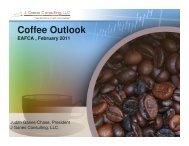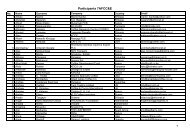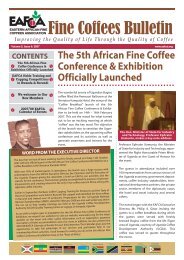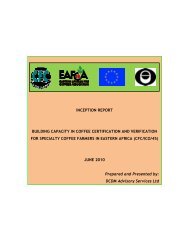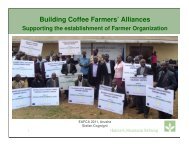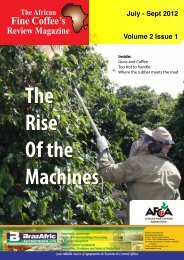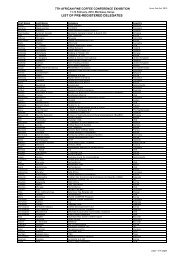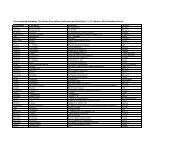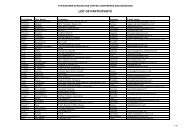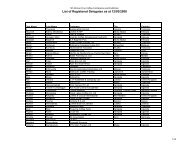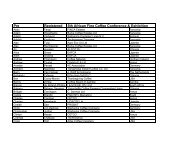African Fine Coffees Review Special Edition Oct-Dec - EAFCA
African Fine Coffees Review Special Edition Oct-Dec - EAFCA
African Fine Coffees Review Special Edition Oct-Dec - EAFCA
Create successful ePaper yourself
Turn your PDF publications into a flip-book with our unique Google optimized e-Paper software.
44<br />
coffee yields.Baker and Haggar (2007) report<br />
that temperature rises over lower lying areas<br />
adversely affect coffee yields. In the same<br />
vein, quality also is affected in that, with rapid<br />
rise in temperature, coffee will ripen more<br />
quickly leading to a fall in quality. Increase<br />
in temperature also favors certain pests and<br />
diseases.<br />
Mitigants for Climate Change…….<br />
For coffee production systems to be<br />
sustainable, it is imperative to take pro-active<br />
measures that mitigate the impacts of climate<br />
change. In mitigating the impact of climate<br />
change, different options may be undertaken.<br />
Coffee producers have several options to<br />
undertake in order to minimize the adverse<br />
impacts of climate change. The International<br />
Trade Center (Climate Change and the<br />
Coffee Industry, 2012) have categorized<br />
these options into short-term and long-term<br />
strategies. The adaptation of these strategies<br />
to coffee production and processing in the<br />
light of the current climate variability varies<br />
according to the different coffee producing<br />
countries in the world.<br />
The short-term mitigation strategies include<br />
better farming practices and more efficient<br />
on-farm processing. The ripple effects of<br />
good agricultural practices (GAP) and good<br />
management practices (GMP) are that water<br />
and soil conservation are attained. As a result,<br />
it leads to adaptation to global warming and<br />
lessening the impacts of climate change. In<br />
the same vein the International Trade Center<br />
(Climate and the Industry, 2012) lists some<br />
of the other technical mitigants in the field<br />
as follows:<br />
• Shading to mitigate increased solar<br />
brilliance, reduce temperature variations<br />
and help retain moisture;<br />
• Improving irrigation and water resources<br />
management;<br />
• Planting hedges and contours to mitigate<br />
wind and water damages;<br />
• Terracing / contouring, drainage and<br />
trapping run-off water;<br />
• Mulching to reduce evaporation, avoid<br />
erosion and improve soil fertility.<br />
The long-term mitigation strategies require<br />
involvement of countries in agreements to<br />
work towards reducing the impact of climate<br />
change. An example of such an agreement<br />
is the Kyoto Protocol. The Kyoto Protocol<br />
is an international agreement linked to the<br />
United Nations Framework Convention<br />
on Climate Change (UNFCCC). The<br />
major feature of the Kyoto Protocol is that<br />
it sets binding targets for thirty-seven<br />
industrialized countries and the European<br />
community for reducing greenhouse gas<br />
emissions. This amounts to an average of<br />
five per cent against the 1990 levels over the<br />
five-year period 2008 – 2012.In this regard,<br />
long-term strategies to improve framework<br />
conditions for adaptation to climate risks are<br />
essential for the coffee industry. It is essential<br />
for nations to invest in technologies that will<br />
enhance more access to renewable energy.<br />
It is the responsibility of global stakeholders<br />
to undertake carbon foot printing, vis-à-vis<br />
an assessment of greenhouse gas emissions<br />
and the impact on the coffee industry and<br />
further draw up strategies that mitigate the<br />
impacts of climate change.<br />
References:<br />
Baker, P. and Haggar, J (2007). Global<br />
Warming: The Impact on Global Coffee.<br />
International Trade Center (2012). Climate<br />
Change and The Coffee Industry<br />
By Filtone Chinyemba Sandando Project Manager, AFCA<br />
About An<br />
Inconvenient Truth<br />
In this blog, our correspondents write about<br />
the developments within the efforts to mitigate<br />
climate change. This blog takes its name from<br />
2006 documentary film directed by Davis<br />
Guggenheim about former United States Vice<br />
President Al Gore’s campaign to educate people<br />
about global warming via a comprehensive slide<br />
show. Since the film’s release, An Inconvenient<br />
Truth has been credited for raising international<br />
public awareness of climate change and reenergizing<br />
the environmental movement. The documentary has<br />
also been included in science curricula in schools<br />
around the world.




